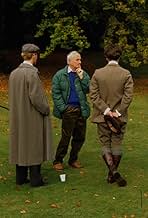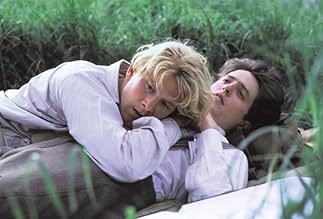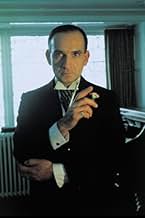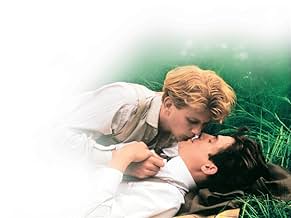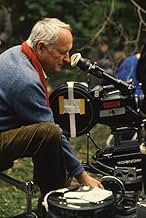CALIFICACIÓN DE IMDb
7.6/10
26 k
TU CALIFICACIÓN
Después de que su amante lo rechaza, un joven atrapado por la opresión de la sociedad eduardiana intenta llegar a un acuerdo y aceptar su sexualidad.Después de que su amante lo rechaza, un joven atrapado por la opresión de la sociedad eduardiana intenta llegar a un acuerdo y aceptar su sexualidad.Después de que su amante lo rechaza, un joven atrapado por la opresión de la sociedad eduardiana intenta llegar a un acuerdo y aceptar su sexualidad.
- Dirección
- Guionistas
- Elenco
- Nominado a 1 premio Óscar
- 3 premios ganados y 2 nominaciones en total
- Dirección
- Guionistas
- Todo el elenco y el equipo
- Producción, taquilla y más en IMDbPro
Opiniones destacadas
"Maurice" (prononced "Morris") is the film adaption of the book by E.M. Forster and stated to be semi-autobiographical of his life. The book was banned for many years and it wasn't until 1987 that this visually splendid film was released from Merchant-Ivory - ("A Room With A View", "Howard's End"). Set in early 19th century England, it details the coming of age story of Maurice Hall, an upper-class aristocrat who falls in love with fellow classmate Clive Durham (Hugh Grant). Shortly after their romance begins, a fellow student is entrapped and imprisoned for soliciting a military officer. Out of fear of losing his inheritance and political future, Clive decides to get married. Although hurt and feeling very alone, Maurice continues a close platonic relationship with Clive. After attempts to "cure" his homosexuality fail, Maurice finds himself falling in love with Clive's gamekeeper, Scudder. With the threat of exposure and blackmail always a real possibility, they must risk everything to build a future together. Supporting performances by Denholm Elliot, Helena Bonham Carter and Ben Kingsley help make this a true classic. The lush and elegant score is available as part a 3-disc set of Merchant-Ivory film scores. Guys, if you're looking for a great "first-date" video, it really doesn't get much better than "Maurice"!
I remember I saw this movie I was about 17. I'd read the book and fell in love. It tells a love story between two men and the way they have to carry it out despite society rules (with some changes it still happens nowadays...).
The general message would be "love conquers all" but is it really so? Are Maurice and Scudder able to live happily ever after? I doubt, and on the beginning of the XXth century it would be even worse.
Despite all, it's lovely to watch the same kind of story we're used to watching in movies that portray society in different times, but now speaking about love between men! Although James Ivory's work is beyond criticism, in my point a view, there were some scenes in the book (the one when they are in London, sitting naked by the fire, for instance) that really should be in the movie.
But it's a tender and romantic approach of of book (only published after E.M. Foster's death) that surely would have pleased it's author.
The general message would be "love conquers all" but is it really so? Are Maurice and Scudder able to live happily ever after? I doubt, and on the beginning of the XXth century it would be even worse.
Despite all, it's lovely to watch the same kind of story we're used to watching in movies that portray society in different times, but now speaking about love between men! Although James Ivory's work is beyond criticism, in my point a view, there were some scenes in the book (the one when they are in London, sitting naked by the fire, for instance) that really should be in the movie.
But it's a tender and romantic approach of of book (only published after E.M. Foster's death) that surely would have pleased it's author.
Many viewers and critics have criticised the happy ending of this film as being 'unrealistic' or even 'impossible'. After all an upper class and working class man could never live as a couple in Edwardian England? In fact E.M. Forster's inspiration for writing the book Maurice was a real gay couple, one upper class and the other working class, who lived together openly in England for about 35 years until 1928. They are buried in the same grave.
Edward Carpenter was a close friend of E.M.Forster, who named Carpenter's working class gay partner, George Merrill, as the inspiration for his novel Maurice. He had visited Carpenter and Merrill at Millthorpe in Derbyshire on several occasions: once, in 1913, Merrill "touched my backside - gently and just above the buttocks. I believe he touched most people's. The sensation was unusual and I still remember it, as I remember the position of a long vanished tooth. He made a profound impression on me and touched a creative spring" That was the origin for the writing of Maurice.
Edward Carpenter was a close friend of E.M.Forster, who named Carpenter's working class gay partner, George Merrill, as the inspiration for his novel Maurice. He had visited Carpenter and Merrill at Millthorpe in Derbyshire on several occasions: once, in 1913, Merrill "touched my backside - gently and just above the buttocks. I believe he touched most people's. The sensation was unusual and I still remember it, as I remember the position of a long vanished tooth. He made a profound impression on me and touched a creative spring" That was the origin for the writing of Maurice.
I ran into this movie a long, long time ago, watching the TV news one evening back in 1987. I felt as I couldn't miss it as soon as I realized it had been shot in Cambridge, my favorite place in the world, but all my feelings went much beyond that when I saw it. I didn't feel uneasy about homosexuality at all but it was with that movie that I finally realized it was only love, no matter whether it involved a man and a woman, or two men, or two women.... The set is magnificent, the actors at their best (a great Hugh Grant who was so great as to show how Mr E.M.Forster had become tired with Clive...), and I must say that Mr Ivory did a pretty good job with his version of the story, very well adapted. In fact I do believe the book is superior in many moments but, on the other hand, the film is far far superior in many other moments, and you can't really say this all the times. I suggest everybody should watch it and enjoy it, no matter what your sexual preferences are. A masterpiece, indeed!
I saw MAURICE when it first appeared in theaters in the mid-80s and enjoyed it. I was surprised on a second viewing on DVD last night at how much I had forgotten about this film. This story of a thwarted love affair between two upper- class men during their years at Cambridge is a deeply absorbing and entertaining adaptation of Forster's posthumously published novel, which I read at in 1971. I thought the book rather dull. The movie seems anything but, which makes me wonder if I shouldn't pull it off my library shelves and give it another go.
Though James Wilby's Maurice Hall is the main character, it is Hugh Grant young aristocrat that is most intriguing here. Clive Durham (Grant) is a spoiled and deeply entrenched member of Britain's snobbish ruling class. It is Durham who pursues Wilby (not the other way around as some of these reviews would have you believe). Initially spooked by Durham's admission of his love for Maurice, he pursues Durham with a naive passion. But that passion is ruined when a fellow classmate from Cambridge is set up by a soldier in a bar and arrested by the police. This young man's future in politics and society is ruined (horrified, Durham says no to him when he asks to testify on his behalf), and he is found guilty and sentenced to six months in jail and hard labor. His picture is splashed across the headlines of London's tabloids. The realization that this could happen to him forces Durham to reject Maurice, pursue and marry a young girl from his class and move himself deeply into the closet. So much for the politics of homosexuality in Britain, circa 1912.
Maurice is devastated by his friend's rejection of him. Miserable, he seeks every avenue he can to reverse and cure his own homosexual longings. He even subjects himself to the quackery of a hypnotist-therapist (Ben Kinsley in a hilarious turn). Maurice finally gives in to his feelings when he finally falls deeply in love with the gamekeeper of Durham's estate (well played by the young and very handsome Rupert Graves).
This Merchant-Ivory film is, typically, gorgeous to look at, its pacing is novelistic and deeply rewarding. Hugh Grant showed early star appeal as the superficial and ultimately defeated victim of his class and society. He would rarely get the chance at so fine a part in the future despite his great success as a light comedian in a string of international hit movies (ABOUT A BOY being one such terrific film performance from this very appealing actor). James Wilby is pitch perfect as the perplexed and emotional Maurice. The expert supporting cast under the commanding direction of James Ivory delivers this period piece superbly. It's period look is typical of Merchant-Ivory productions--detailed, richly appointed and very beautiful. Kudos also to Kit Hesketh-Harvey's excellent screenplay.
One viewer here complained that ending was far too upbeat and unrealistic for its time, but I really didn't see it that way. There were many men and women who set up housekeeping in both London and New York, living their lives in discreet harmony under the noses of hostile societies. Still others preferred to move abroad to live their lives in discrete peace and tranquility. I prefer to think this is just what Maurice and Scudder do. If Maurice were as much of a snob as Durham, this might not have worked. But we see Maurice's slow understanding of the hypocrisy of his class in the aftermath of his affair with Durham, and he comes to realize that even he is somewhat constrained by his own upper-class upbringing in his initial interactions with Scudder's far lower standing.
This is a deeply affecting movie and holds up superbly. Highly recommended.
Though James Wilby's Maurice Hall is the main character, it is Hugh Grant young aristocrat that is most intriguing here. Clive Durham (Grant) is a spoiled and deeply entrenched member of Britain's snobbish ruling class. It is Durham who pursues Wilby (not the other way around as some of these reviews would have you believe). Initially spooked by Durham's admission of his love for Maurice, he pursues Durham with a naive passion. But that passion is ruined when a fellow classmate from Cambridge is set up by a soldier in a bar and arrested by the police. This young man's future in politics and society is ruined (horrified, Durham says no to him when he asks to testify on his behalf), and he is found guilty and sentenced to six months in jail and hard labor. His picture is splashed across the headlines of London's tabloids. The realization that this could happen to him forces Durham to reject Maurice, pursue and marry a young girl from his class and move himself deeply into the closet. So much for the politics of homosexuality in Britain, circa 1912.
Maurice is devastated by his friend's rejection of him. Miserable, he seeks every avenue he can to reverse and cure his own homosexual longings. He even subjects himself to the quackery of a hypnotist-therapist (Ben Kinsley in a hilarious turn). Maurice finally gives in to his feelings when he finally falls deeply in love with the gamekeeper of Durham's estate (well played by the young and very handsome Rupert Graves).
This Merchant-Ivory film is, typically, gorgeous to look at, its pacing is novelistic and deeply rewarding. Hugh Grant showed early star appeal as the superficial and ultimately defeated victim of his class and society. He would rarely get the chance at so fine a part in the future despite his great success as a light comedian in a string of international hit movies (ABOUT A BOY being one such terrific film performance from this very appealing actor). James Wilby is pitch perfect as the perplexed and emotional Maurice. The expert supporting cast under the commanding direction of James Ivory delivers this period piece superbly. It's period look is typical of Merchant-Ivory productions--detailed, richly appointed and very beautiful. Kudos also to Kit Hesketh-Harvey's excellent screenplay.
One viewer here complained that ending was far too upbeat and unrealistic for its time, but I really didn't see it that way. There were many men and women who set up housekeeping in both London and New York, living their lives in discreet harmony under the noses of hostile societies. Still others preferred to move abroad to live their lives in discrete peace and tranquility. I prefer to think this is just what Maurice and Scudder do. If Maurice were as much of a snob as Durham, this might not have worked. But we see Maurice's slow understanding of the hypocrisy of his class in the aftermath of his affair with Durham, and he comes to realize that even he is somewhat constrained by his own upper-class upbringing in his initial interactions with Scudder's far lower standing.
This is a deeply affecting movie and holds up superbly. Highly recommended.
¿Sabías que…?
- TriviaIn the DVD extras, Hugh Grant says that because he and James Wilby already knew each other from appearing in Privileged (1982) together, they were able to practice their scenes together at Grant's house the night before Wilby's audition. Grant says that he remembers it "being a surprise to my banker brother when he came home and found me kissing James Wilby in the front room."
- ErroresDuring one of the earlier scenes while Maurice and others are reading/translating with a professor/dean, Maurice is seen clearly wearing a wristwatch. While wristwatches did exist at the time they were rare, and were considered working class so would not have been worn by a gentleman. The wristwatch would not become common until the first world war, when they were given to soldiers to allow them to see the time while both hands were engaged.
- Citas
Maurice Hall: I'm an unspeakable of the Oscar Wilde sort.
- Versiones alternativasSome NTSC versions are scanned at 25fps and the running time is short and seems edited but the movie is intact.
- Bandas sonorasMiserere Psalm 51
Written by Gregorio Allegri
Sung by The Choir of Kings College Cambridge
Courtesy of The Decca Record Company LTD.
Selecciones populares
Inicia sesión para calificar y agrega a la lista de videos para obtener recomendaciones personalizadas
- How long is Maurice?Con tecnología de Alexa
Detalles
- Fecha de lanzamiento
- Países de origen
- Sitios oficiales
- Idioma
- También se conoce como
- Moris
- Locaciones de filmación
- Productoras
- Ver más créditos de la compañía en IMDbPro
Taquilla
- Presupuesto
- GBP 1,577,000 (estimado)
- Total en EE. UU. y Canadá
- USD 2,484,230
- Fin de semana de estreno en EE. UU. y Canadá
- USD 49,278
- 20 sep 1987
- Total a nivel mundial
- USD 2,643,324
- Tiempo de ejecución2 horas 20 minutos
- Mezcla de sonido
- Relación de aspecto
- 1.66 : 1
Contribuir a esta página
Sugiere una edición o agrega el contenido que falta



